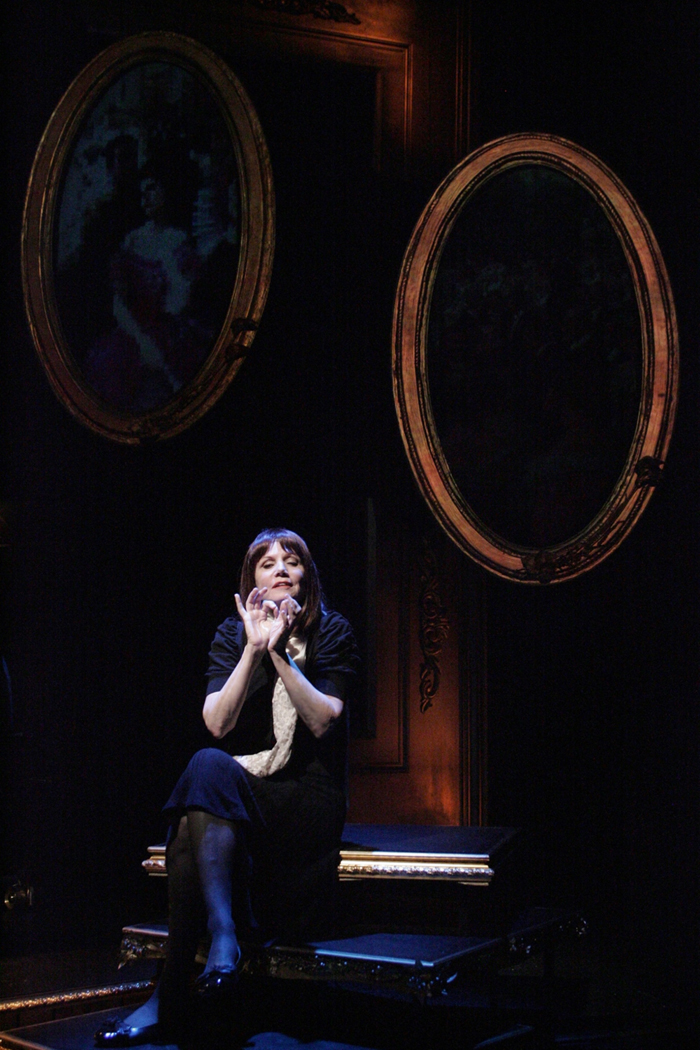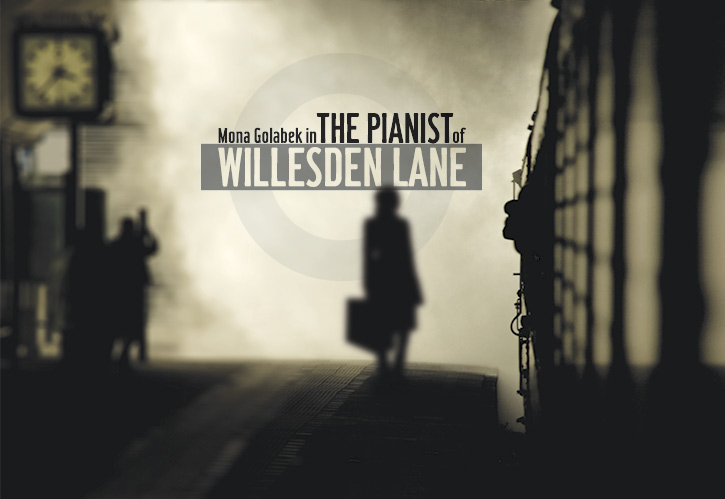 Adapted by Hershey Felder from the book The Children of Willesden Lane, by Los Angelean pianist Mona Golabek and Lee Cohen, this is the true story of Golabek's mother, Lisa Jura. As a young Jewish pianist Jura's dreams about her Vienna concert debut were shattered by the Nazis in the 1938 Anschluss like the glass of Kristallnacht, as her family bravely placed her on the Kindertransport to London.
Adapted by Hershey Felder from the book The Children of Willesden Lane, by Los Angelean pianist Mona Golabek and Lee Cohen, this is the true story of Golabek's mother, Lisa Jura. As a young Jewish pianist Jura's dreams about her Vienna concert debut were shattered by the Nazis in the 1938 Anschluss like the glass of Kristallnacht, as her family bravely placed her on the Kindertransport to London.
At first sight the set resembles a music salon or concert hall dominated by a magnificent Steinway grand piano, with mirrors in ornate gilded frames on the walls behind and a bank of flowers around the footlights.
Golabek, a slight red-head dressed simply in black, moves into the light on the steps and turns the warmth of her smile on her audience to address them. Soon she turns to the piano from where she will tell so much of the story about her mother. As her long elegant fingers touch the keys, she reveals one of the most potent reasons for the success of her loving tribute to her mother. Having inherited her mother’s gift, because she took in the stories about her mother's life as Jura taught her to play the piano, Golabek can perfectly time her storytelling to create a seamless weave between words and music, underscoring with great sensitivity and, when necessary, allowing words or music to breathe alone.
It’s a story at once singular and familiar – as in the end perhaps all such stories are. Every Holocaust survivor’s story reveals a family life cruelly cut short, a childhood abruptly ended, heart-breaking separation from loved ones. Jura is no different, her mutual love for her parents and sisters is quite enough to make her story heart-breaking. But her particular heartbreak – and her salvation – is her passion for the piano music she was born to play.
Jura lives for her weekly piano lessons, dreaming of making her professional debut with Grieg’s piano concerto as she crosses Vienna to see her music professor. But this is the week that he has been ordered to give up his Jewish pupils and this is just the start of the restrictions and persecutions the Anschluss and the arrival of the Nazis brings to the city’s Jews. So no sooner has Golabek evoked the rich cultural life of pre-war Vienna, the salons, cafés and concert halls (cleverly illustrated by photographs and film projected on all those mirrors by projection designer Andrew Wilder, with lighting designer Christopher Rynne), than her mother’s dreams are shattered in the glass of Kristallnacht. Jura’s father is humiliated and forced to clean the streets, but there is a chance for just one of his girls to escape on the Kindertransport. The terrible choice must be made and falls on the young pianist.
Jura’s own evocations of her life, lovingly painted for her daughter as they sat together at the piano must have been extraordinarily vivid and reinforced by constant retelling too, for Golabek’s own retelling is spellbinding, tracing her mother’s journey across Europe, her arrival in pre-war Britain, and eventually, after a sojourn in the Sussex countryside, at the hostel in Willesden Lane, filled with other young people with similar stories.
The welcome she receives there, how she enthrals her new friends as she is drawn to play the hostel’s piano, what befalls her during the air raids and above all the kindness of strangers as well as her fellows, is the stuff from which Golabek and director/adaptor Hershey Felder mould such a rich show.
When Jura gets work in an East End garment factory, Golabek draws a striking analogy between the notes she plays on the keys of the piano and its strings, the textures of the music she weaves and the ‘music’ of the sewing machines on which she works, weaving garments at the factory.
Golabek’s musical selection is an eclectic delight, including Beethoven, Debussy, Chopin, Bach and many more from Jura’s classical repertoire, spiced with a couple of popular songs also dear to her mother’s heart – Gershwin’s Strike Up the Band and These Foolish Things (Eric Maschewitz and Jack Strachey).
It would be a shame to reveal all of Jura’s uplifting story, but there are delightful vignettes on the way – of Myra Hess at the piano in her famous lunchtime concerts at the National Gallery during and after the Blitz; of ‘our brave boys’ at rest and play in the piano bar where she gets to play for her living, to save her fingers from being ruined at those machines; and of the folk she meets in war-torn, bombed out London, her co-workers at the factory and her peers at the hostel all showing solidarity with the young pianist and rooting for her as she triumphs at last.
There is of course romance too, but again it would be telling to reveal the story of how Jura meets the man who will be the father of the children to whom she will one day pass on her talent and her love of music and her story.
So see – and hear – this beautiful, heart-warming show for yourself. It is especially poignant that it plays here through the week of Holocaust Memorial Day; and not surprising to hear that it has sold out for months in New York and toured the USA too, where Golabek educates young people about the Holocaust with a film, as well as this theatre piece based on her book The Children of Willesden Lane.
By Judi Herman
The Pianist of Willesden Lane runs until Saturday 27 February, 7.30pm & 2.30pm, £22.50-£40, at St James Theatre, 12 Palace St, SW1E 5JA; 0844 264 2140. www.stjamestheatre.co.uk
Watch a brief extract from the show below:
To find out more about all the projects in which Mona Golabek and her family are involved, including the documentaries, I am a Pianist and Finding Lea Tickotsky, and the book The Children of Willesden Lane: Beyond the Kindertransport – A Memoir of Music, Love and Survival by Mona Golabek and Lee Cohen, visit holdontoyourmusic.org.



